Featured
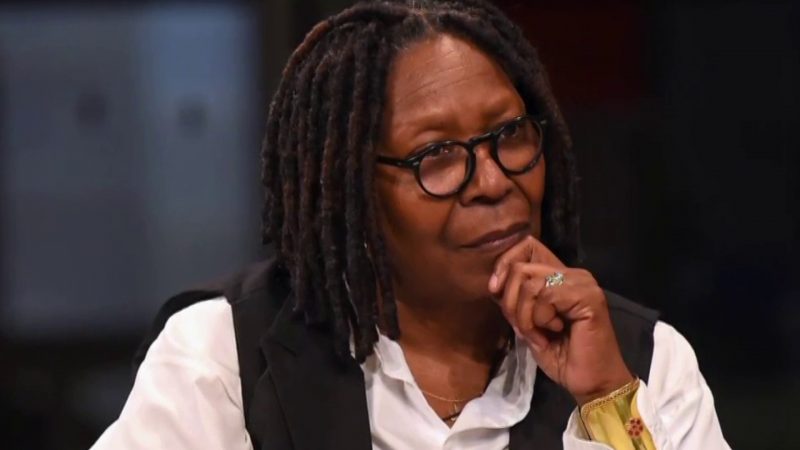 Whoopi Goldberg’s baffling claim forced many to ask tough questions about race and identity in the US. By Brandon Tensley / CNN
Whoopi Goldberg’s baffling claim forced many to ask tough questions about race and identity in the US. By Brandon Tensley / CNN
Whoopi Goldberg’s claim earlier this week that the Holocaust wasn’t about race was baffling and shocking. An apology followed, along with a two-week suspension — but the controversy has forced deeper questions about the history and evolution of race and identity in the US. Goldberg made her comments during a conversation about a Tennessee school board that removed Art Spiegelman’s Pulitzer Prize-winning graphic novel series “Maus,” about the horrors and trauma of the Holocaust, because of alleged concerns about “rough, objectionable language” and nudity. Swiftly, various groups pointed out as false the actor and comedian’s assertion that the genocide of 6 million Jews had nothing to do with race. Read more
Related: On Whoopi Goldberg’s Comments and the Origins of Racism. By Jamelle Bouie / NYT
Political / Social
 Trump’s race-war fantasies continue to escalate — while the media pretends not to notice. By Chauncey Devega / Salon
Trump’s race-war fantasies continue to escalate — while the media pretends not to notice. By Chauncey Devega / Salon
Every day, Donald Trump becomes more his horrible true self. He commands the loyalty of tens of millions of people. He does not even pretend to be a statesman who loves America. He is a political cult leader, a sociopath and a model of antisocial and dangerous behavior. As psychologists and other public health experts have warned, Trump has “infected” many of his most loyal followers with the same mental pathologies. Trump has an erotic attachment to violence, as do many of his followers. They are tied together by the Big Lie and other sadistic, and anti-human fictions. TrumpWorld is a malignant and vile alternate universe — one that longs to devour and consume the world as it actually exists. Read more
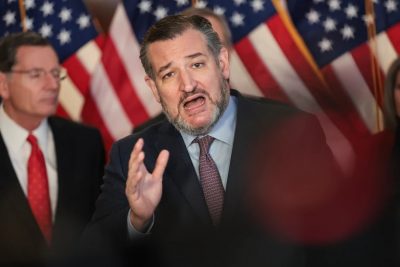 Republicans’ animus toward Biden’s Supreme Court pledge shows how they’re no longer veiling their racism. By Eugene Robinson / Wash Post
Republicans’ animus toward Biden’s Supreme Court pledge shows how they’re no longer veiling their racism. By Eugene Robinson / Wash Post
If the Republican Party has any sort of platform these days, it appears to involve stoking White grievance and opposing even modest steps to foster diversity. That’s not a partisan argument; I’m just noting what Sen. Ted Cruz (R-Tex.) and a few of his colleagues are saying about President Biden’s promise to nominate a Black woman to the Supreme Court. On his podcast, “Verdict With Ted Cruz,” the senator recently called Biden’s pledge “offensive.” Read more
 The Exploitation of ‘Freedom’ in America. By Elisabeth Anker / NYT
The Exploitation of ‘Freedom’ in America. By Elisabeth Anker / NYT
It would seem there is a lot of “freedom” being trumpeted by state officials these days.
Within hours of becoming governor of Virginia, Glenn Youngkin signed an executive order to ban the teaching of critical race theory, explaining that the state must promote “freedom of thought.” He then moved to lift mask mandates in public schools, citing “individual liberty.” In mid-January, Florida lawmakers debated an “individual freedom” bill that would limit discussions about race and discrimination in schools and businesses. Read more
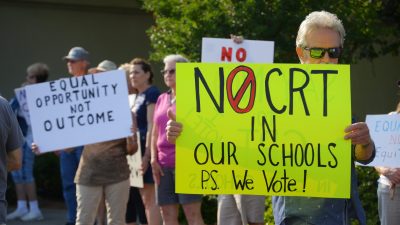 The Backlash Against C.R.T. Shows That Republicans Are Losing Ground. By Jamelle Bouie / NYT
The Backlash Against C.R.T. Shows That Republicans Are Losing Ground. By Jamelle Bouie / NYT
I am not so Whiggish in my thinking as to believe that this effort to censor American history for students is doomed to failure. But I do think that the urgency with which it has been fought is a sign of something important. The ferocity of the drive to keep serious discussions of race and racism out of America’s classrooms is an admission, however tacit, that something has changed, and conservatives are on the losing end of that transformation. Where once they were an establishment — such that Du Bois was a voice in the wilderness — now they are on the defensive. Put simply, the people and institutions behind the bans on “critical race theory” are fighting a rear-guard action, and they know it. Read more
Related: How the “critical race theory” moral panic morphed into book-banning frenzy. By Thom Hartman / Salon
Related: Virginia’s new lost cause. By Atif Qarni / Wash Post
 Looking Beyond Affirmative Action. By Conor Friedersdorf / The Atlantic
Looking Beyond Affirmative Action. By Conor Friedersdorf / The Atlantic
Readers suggest that simply continuing—or ending—it are not the only options.
Earlier this week, I asked for your thoughts on racial preferences in college admissions. For context, Pew found in 2019 that “most Americans (73%) say colleges and universities should not consider race or ethnicity when making decisions about student admissions. Just 7% say race should be a major factor in college admissions, while 19% say it should be a minor factor.” Read more
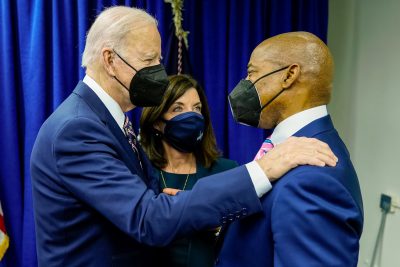 Biden seeks to burnish anti-crime credentials in NYC visit. By Annie Linskey / Wash Post
Biden seeks to burnish anti-crime credentials in NYC visit. By Annie Linskey / Wash Post
President Biden, facing pressure to show he’s taking a tough approach to the nation’s rising murder rate, visited New York City’s police headquarters Thursday, stressing his support for law enforcement at a time during which many liberals are calling for far-reaching police reforms. Biden was accompanied by New York Mayor Eric Adams (D), one of group of newly elected mayors across the country who are seeking to beef up policing in ways that depart from social justice rhetoric that dominated the country’s big cities just two years ago. Read more
Related: How Democrats went from defund to refund the police. By
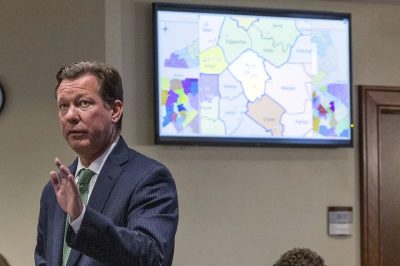 North Carolina Supreme Court strikes down redistricting maps. By AP and NPR
North Carolina Supreme Court strikes down redistricting maps. By AP and NPR
Phil Strach, an attorney for Republican legislators speaks during a partisan gerrymandering trial on Jan. 5, 2022.
The court’s decision reversed a ruling last month from a panel of three trial judges that let the maps stand, and declared partisan gerrymandering found in the redistricting approved by the legislature in November violated several provisions in the North Carolina Constitution. They include the right to free elections, freedom of speech and equal protections of citizens. Read more
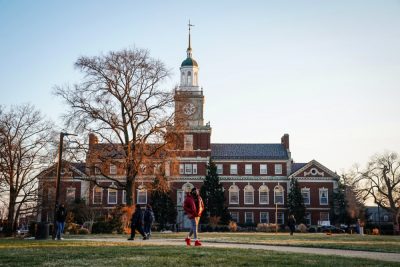 HBCUs have long been a target for racial backlash. By
HBCUs have long been a target for racial backlash. By
This week more than a dozen historically Black colleges and universities across the country were again forced to lock down campuses and cancel classes because of bomb threats. The FBI has identified six “tech-savvy” juveniles as persons of interest in the threats, which appear to be racially motivated, officials said. That comes as no surprise to experts who spoke with NBC News, who said the threats were acts of intimidation, building on years of attempts to racially terrorize Black Americans through some of the community’s most important institutions. Read more
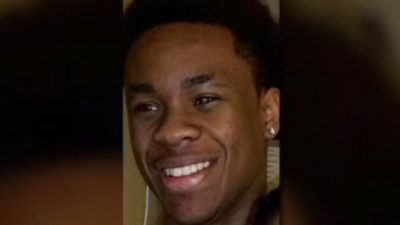 Minneapolis Police Killed Amir Locke in a No-Knock Raid—After the City Promised to Ban Them. By Eamon Whalen / Mother Jones
Minneapolis Police Killed Amir Locke in a No-Knock Raid—After the City Promised to Ban Them. By Eamon Whalen / Mother Jones
Early on Wednesday morning, a Minneapolis police officer working as part of a SWAT team shot and killed Amir Locke using a raid tactic that the city and its Democratic mayor, Jacob Frey, had said they would ban in the wake of George Floyd’s murder. A 22-year-old Black man sleeping on his friend’s couch, Locke was shot within nine seconds of the police entering the downtown apartment. Police confirmed, after releasing body-camera footage Thursday night, that the SWAT team conducted a no-knock raid—a controversial tactic cops used in Louisville, Kentucky, when they killed Breonna Taylor, and which politicians had said they would ban in Minneapolis after the murder of George Floyd. Read more
Related: Amir Locke Filed Paperwork To Launch A Music Business. By Sara Burnett / AP and HuffPost
 Ahmaud Arbery’s killers headed to federal trial after withdrawing guilty pleas on hate crime charge. By Li / NBC News
Ahmaud Arbery’s killers headed to federal trial after withdrawing guilty pleas on hate crime charge. By Li / NBC News
Two men convicted in the killing of Ahmaud Arbery told a judge in Georgia on Friday they’ll go to trial on federal hate crime charges after a deal with prosecutors fell apart. Gregory McMichael and son Travis McMichael had reached a deal with federal prosecutors that their 2020 slaying of Arbery, who is Black, was a racially motivated attack. The white defendants, convicted in state court in November and sentenced to life behind bars, were going to admit their guilt in U.S. District Court in exchange for spending the first 30 years of their imprisonment in a federal penitentiary. But Arbery’s family balked at the deal, insisting the men shouldn’t be allowed to pick the locale of their confinement. Read more
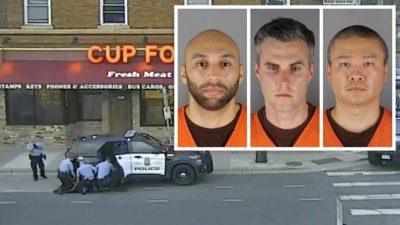 George Floyd and the ‘duty to intervene.’ By Marten Powers / Wash Post Podcast
George Floyd and the ‘duty to intervene.’ By Marten Powers / Wash Post Podcast
Former Minneapolis police officers J. Alexander Kueng, Thomas K. Lane and Tou Thao are facing trial on federal charges that they deprived George Floyd of his federal civil rights in the fatal May 2020 arrest. Reporter Holly Bailey has been reporting on the courtroom proceedings — a process that’s played out much differently than in Chauvin’s trial. “It feels like we’re really going to get deep into what police officers in Minneapolis are trained to do, and how exactly they are trained,” Bailey says. Listen here
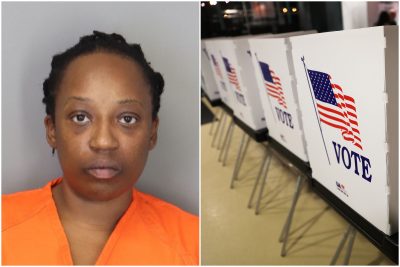 Who Is Pamela Moses? Black Woman Sentenced to Prison for Trying To Vote. By Isabel Van Brugen / Newsweek
Who Is Pamela Moses? Black Woman Sentenced to Prison for Trying To Vote. By Isabel Van Brugen / Newsweek
Memphis activist Pamela Moses was sentenced to six years and one day in prison on Monday, having been convicted in November 2021 of illegally registering to vote in 2019. Moses has argued that she believed her voting rights had been restored when she looked into voting in 2019. “I did not falsify anything. All I did was try to get my rights to vote back the way the people at the election commission told me and the way the clerk did,” she said during her sentencing hearing on January 26, WREG-TV Memphis reported. Judge Mark Ward, who sentenced Moses, accused her of deceiving officials. Read more
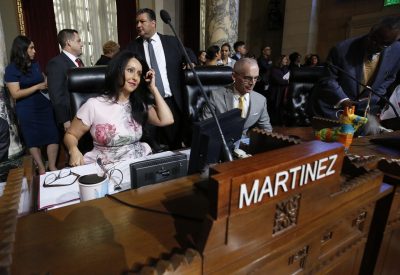 Latinas are well represented in the labor force. In Congress, not so much. By Suzanne Gamboa / NBC News
Latinas are well represented in the labor force. In Congress, not so much. By Suzanne Gamboa / NBC News
Latinas are the largest group of women, after non-Hispanic whites, in the U.S. workforce, but they are barely represented in the work of writing the country’s laws and deciding how taxes and other revenue gets spent. There are more than 12.6 million Hispanic women in the labor force, accounting for 16 percent of the female workforce, according to the Labor Department. But in Congress, Latinas are about 3 percent of the voting representatives and senators. Read more
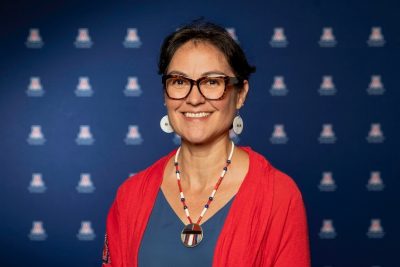 Shelly Lowe confirmed as chair of the National Endowment for the Humanities. By Peggy McGlone / Wash Post
Shelly Lowe confirmed as chair of the National Endowment for the Humanities. By Peggy McGlone / Wash Post
Shelly C. Lowe was confirmed Wednesday by the Senate to be the 12th chair of the National Endowment for the Humanities, making her the first Native American to lead the federal agency. President Biden nominated Lowe for the nation’s top humanities position in October, when he also nominated Maria Rosario Jackson to lead the National Endowment for the Arts. Jackson was confirmed Dec. 18 and started her tenure last week. Read more
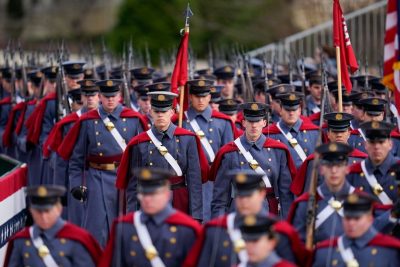 VMI will change honor system that expels Black cadets at disproportionate rates. By Ian Shapira / Wash Post
VMI will change honor system that expels Black cadets at disproportionate rates. By Ian Shapira / Wash Post
Ethics / Morality / Religion
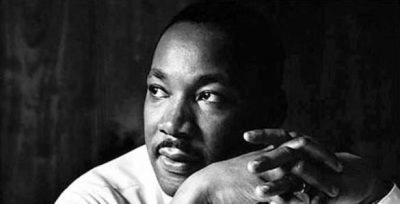 MLK’s Forgotten Call for Economic Justice. By Martin Luther King Jr. / The Nation
MLK’s Forgotten Call for Economic Justice. By Martin Luther King Jr. / The Nation
This article was written by Dr. Martin Luther King Jr. for The Nation in 1966.
At the end of 1965 the civil rights movement was widely depicted as bewildered and uncertain, groping desperately for new directions. The substantial legislative accomplishments of the past several years, it was argued, dealt so extensively with civil rights problems that the movement had become stagnated in an embarrassment of riches. Negro leaders, we were told, did not know how to maintain their assembled armies nor what goals they should seek. Read more
 The Dissenters Trying to Save Evangelicalism From Itself. David Brooks / NYT
The Dissenters Trying to Save Evangelicalism From Itself. David Brooks / NYT
Thabiti Anyabwile pastors the largely Black Anacostia River Church in Washington, D.C. “It’s been at times agonizing and bewildering,” he says. “My entire relationship landscape has been rearranged. I’ve lost 20-year friendships. I’ve had great distance inserted into relationships that were once close and I thought would be close for life. I’ve grieved.” This is what has happened over the past six years to millions of American Christians, especially evangelicals. There have been three big issues that have profoundly divided them: the white evangelical embrace of Donald Trump, sex abuse scandals in evangelical churches and parachurch organizations, and attitudes about race relations, especially after the killing of George Floyd. Read more
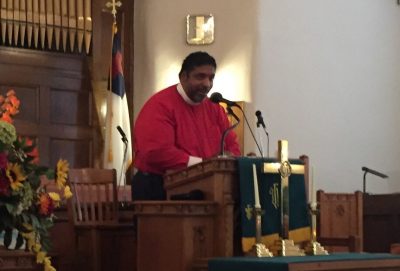 Connect! Unite! Act! Thinking about a moral budget. By Christopher Reeves / Daily Kos
Connect! Unite! Act! Thinking about a moral budget. By Christopher Reeves / Daily Kos
The Poor People’s Campaign, Kairos, Repairers of the Breach, and The Institute for Policy Studies took a step back and looked at how the United States spends money, and why Republicans being outraged at the Build Back Better plan shows how out of touch they are with morality. Republicans are outraged at $170 billion in yearly expenses for Build Back Better. Yet, when it comes to the $778 billion dollars per year we spend on national defense, there isn’t a lot of pushback. In fact, if you were to look at one of the top contractors—Lockheed Martin—you rarely hear about the outrage over $75 billion yearly. We’ll spend $17.5 billion on Trump’s “Space Force.” There are some serious problems with how we put together a budget if it is designed to reflect our values. Read more
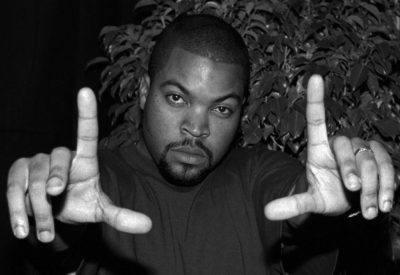 Ice Cube’s ‘Good Day’ taught me how to pray the Examen. by Shemaiah Gonzalez / NCR
Ice Cube’s ‘Good Day’ taught me how to pray the Examen. by Shemaiah Gonzalez / NCR
It was 1993, my senior year of high school, when the preeminent track was released off Ice Cube’s third solo album, “The Predator.” Part chill-out, part swagger, the track walked through a day in the life of South Central Los Angeles. Over sampling from the Isley Brothers’ “Footsteps in the Dark,” Ice Cube rapped about breakfast with his family, winning a pickup game of basketball, watching MTV at his friend’s house and winning at dominoes. A good day. Fifteen years later, when I converted to Catholicism, I was introduced to the Prayer of Examen. More than 400 years ago, St. Ignatius Loyola, founder of the Jesuit order, encouraged his followers to pray the Examen, or examination of conscience, at the end of each day. Read more
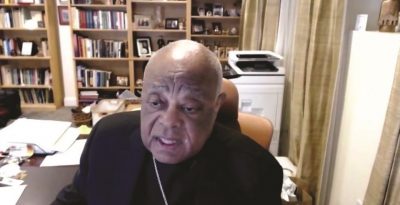 Reject racism to ‘live the way’ Creator intended us to live, cardinal says. By Richard Szczepanowski / NCR
Reject racism to ‘live the way’ Creator intended us to live, cardinal says. By Richard Szczepanowski / NCR
People must “reject all forms of racism, bigotry and injustice” and recognize “we are each made by God and are deserving of respect and dignity because of just that,” Washington Cardinal Wilton D. Gregory said Feb. 3. Only then will mankind “live the way we were intended to live by the Creator,” he said in a Black History Month address. “We each are called to reach beyond ourselves — that which is comfortable and familiar. As a human family, we are to be a good neighbor to one another,” Cardinal Gregory said. “This is the only way to bring about true justice for all American and global citizens.” Read more
Historical / Cultural
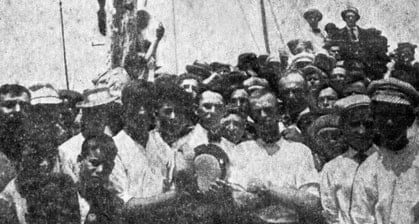 The True Legacy of Lynching Lies in How We Remember the Victims. By Clint Smith / The Atlantic
The True Legacy of Lynching Lies in How We Remember the Victims. By Clint Smith / The Atlantic
In Maryland, a memorial for two lynching victims reveals how America is grappling with its history of racial terror.
Under a large white tent on a warm Sunday in early autumn, a group of residents in Montgomery County, Maryland, gathered at Welsh Park in the town of Rockville. A crescendo of gospel hymns hung above the crowd before falling gently over us like a warm bedsheet. A small group of children squealed from a playground in the distance. We were there to remember the lives of two Black men who had been lynched in the county more than a century ago. This is the county where I live. Before this event I did not know these men’s names, but now I do. Read more
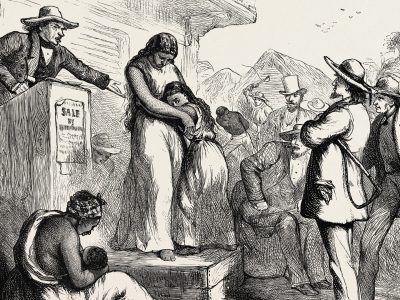 Did You Study the Slave Trade in School or Were You Out That Day. By A.E. Rooks / The Daily Beast
Did You Study the Slave Trade in School or Were You Out That Day. By A.E. Rooks / The Daily Beast
When history is gutted of accuracy for comfort or convenience, we’re robbed of the knowledge that wishing for better isn’t enough.
If your early history education was anything like mine, we didn’t learn much about the transatlantic slave trade before college. It was a Very Bad Thing that operated in a triangular fashion, that was made clear, but pedagogically speaking the late 18th through mid-19th century was little more than the quick intake of breath between weeks of waxing rhapsodic on wars for the soul of the nation. Past the ratification of the Constitution, there might be a little Monroe Doctrine here, some slavery and abolition there, occasional forays into the Second Great Awakening and Seneca Falls, but generally the nearly six-decade intermission between the Revolutionary and Civil Wars never seemed to merit more than a few hours of hasty overview. Read more
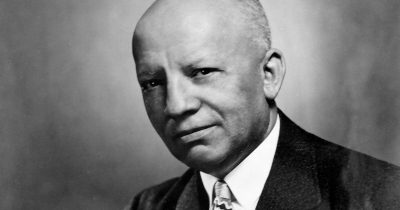 Black History Month founder showed how schools should teach about race.By DeNeen L. Brown / Wash Post
Black History Month founder showed how schools should teach about race.By DeNeen L. Brown / Wash Post
In his red-brick rowhouse in the heart of D.C., the man who would become known as the “father of Black history” wrote furiously. From a second-floor “home office” at 1538 Ninth St. NW, Carter G. Woodson led and orchestrated a movement to document Black history, dictating dozens of books, letters, speeches, articles and essays promoting Black people and their place in American history. “If a race has no history,” Woodson wrote, “it has no worthwhile tradition, it becomes a negligible factor in the thought of the world, and it stands in danger of being exterminated.” Read more
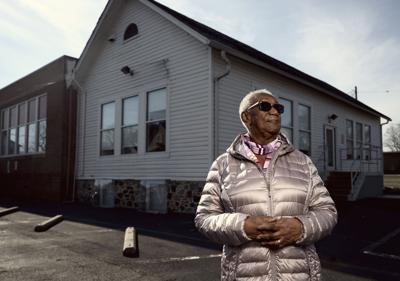 In Maryland, a segregated school is one of many in the country to be preserved. By Joseph Williams / Wash Post
In Maryland, a segregated school is one of many in the country to be preserved. By Joseph Williams / Wash Post
Using crepe paper, my mother, Constance Williams, and a handful of girls made flowers and dresses in preparation for Havre de Grace Colored High School’s May Day celebration in the late 1940s. The festival’s centerpiece of dancing around the maypole as they braided a colorful pattern captivated a young Constance. “It sometimes was cold,” but it didn’t matter, says the 89-year-old, her face alight as she talks. “I thought it was the most beautiful thing.” My parents rarely spoke of the hardships that went along with education in the Jim Crow era, like the secondhand desks and tattered textbooks, the basement science lab or the grassy vacant lot with homemade bleachers serving as the school gymnasium. “I loved being there,” my mother says. “I was proud to graduate from there. The cohesiveness and the closeness made you feel like you belonged.” Read more
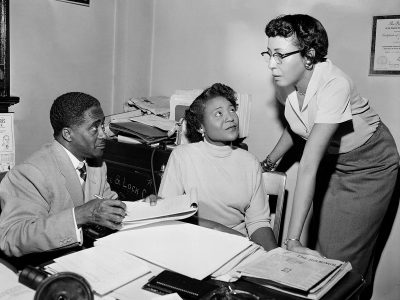 First Black University of Alabama student to share a building name with a Klan Leader. By AP and NPR
First Black University of Alabama student to share a building name with a Klan Leader. By AP and NPR
Autherine Lucy Foster, center, the first Black person to attend the University of Alabama, is shown discussing her return to campus following mob demonstrations in Birmingham, Ala., in 1956 with Ruby Hurley, right, Southeast regional secretary of the NAACP, and attorney Arthur Shores.
A University of Alabama building named for a former governor who led the Ku Klux Klan a century ago will also bear the name of the first Black person to attend the school, trustees decided. Graves Hall, an academic building named for two-term Gov. Bibb Graves, a progressive who also was Grand Cyclops of the KKK before leaving the group in the late 1920s, will become Lucy-Graves Hall to recognize Autherine Lucy Foster, who in 1956 became the first Black person to enroll at Alabama. Read more
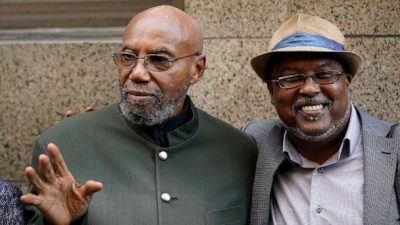 Malcolm X’s daughter calls for federal inquiry into his murder.
Malcolm X’s daughter calls for federal inquiry into his murder.
“We want to know the truth. We want to know why our father was killed and who did it,” Ilyasah Shabazz, one of Malcolm X’s six daughters, told ABC News’ “Soul of a Nation Presents: X/onerated: The Murder of Malcolm X and 55 Years to Justice.” Two men who were convicted of killing Malcolm X – Aziz Muhammad and Khalil Islam – were exonerated in November 2021 following a re-examination of the case by the New York District Attorney’s Office, after being asked to look into it by civil rights attorneys David Shanies and Deb Francois and the Innocence Project. Read more
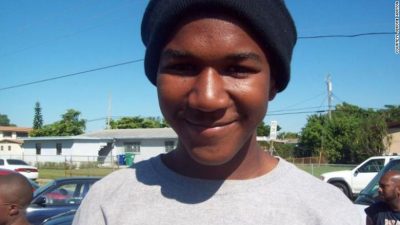 How Trayvon Martin’s life and death inspired a generation to fight for justice. By Giselle Rhoden and Kaanita Iyer / CNN
How Trayvon Martin’s life and death inspired a generation to fight for justice. By Giselle Rhoden and Kaanita Iyer / CNN
In 2012, Nupol Kiazolu entered Stone Mountain Middle School with a pack of Skittles, a bottle of iced tea and a gray hoodie that read: “Do I Look Suspicious?” The 12-year-old was threatened with suspension and expulsion from the school in Stone Mountain, Georgia. When she was sent to her principal’s office and was asked why she wore the hoodie, Kiazolu said she cited Tinker v. Des Moines, establishing her right to peacefully protest in school. Kiazolu is part of a generation of young people whose lives were forever changed by Martin’s death. Today marks what would have been his 27th birthday, and his life and death continue to fuel activists’ pledge to get justice for Black lives. Read more
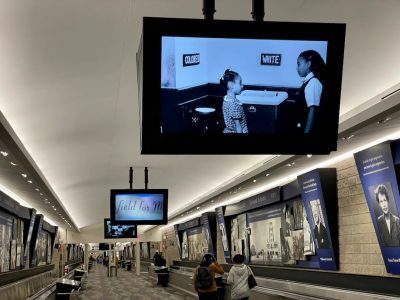 Atlanta’s unexpected civil rights museum: Its airport. By Larry Bleiberg / Wash Post
Atlanta’s unexpected civil rights museum: Its airport. By Larry Bleiberg / Wash Post
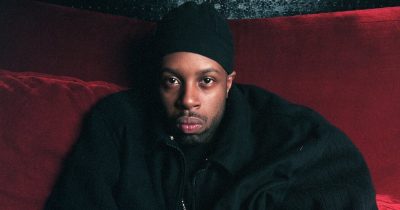 J Dilla Was a Revered Rap Producer. A New Book Deepens His Legacy.
J Dilla Was a Revered Rap Producer. A New Book Deepens His Legacy.
The Detroit musician wasn’t known to give many interviews, and his influence has grown exponentially since his 2006 death. “Dilla Time” by Dan Charnas explores what drove him.
Even during his lifetime, there was something unexplainable about J Dilla, the Detroit-born hip-hop producer and M.C. He was an open secret, an under-acknowledged force shifting and shaping modern music. Followers spoke of him reverentially and with enough hyperbole that he could feel inaccessible to listeners who didn’t quite get it. In the 16 years since his death, the aura around him has only grown. The writer Dan Charnas conducted nearly 200 interviews to write “Dilla Time,” a 400-page biography out Feb. 1 that thoroughly examines the hip-hop producer’s unique approach. Read more
Sports
 ‘All He’s Looking for Is a Sincere Shot.’ Jeré Longman and
‘All He’s Looking for Is a Sincere Shot.’ Jeré Longman and
Those close to Brian Flores say his lawsuit against the N.F.L. is in keeping with the sense of moral rectitude he learned from his mother as he grew up in a Brooklyn housing project.
During his first preseason as the Miami Dolphins’ head coach, in 2019, Brian Flores spoke with emotion about the social injustice he faced as a young Black and Latino man in the distressed Brownsville section of Brooklyn. Referring to athletes like Kenny Stills, then a Dolphins receiver, and the ostracized quarterback Colin Kaepernick, Flores said he applauded those who protested against racial inequality and police brutality. “They’re bringing attention to my story,” Flores, the son of Honduran immigrants, told reporters. “I’m the son of immigrants. I’m Black. I grew up poor. I grew up in New York during the stop-and-frisk era. I’ve been stopped because I fit a description before. So everything these guys protest, I’ve lived it, I’ve experienced it.” Read more
Related: Brian Flores’ lawsuit: Black coaches skeptical that NFL will change. By Mike Jones / USA Today
 Where are the people of color at the Winter Olympics? By Chris Bumbaca / USA Today
Where are the people of color at the Winter Olympics? By Chris Bumbaca / USA Today
The ski lift operators would slow the chairlift down for him, not knowing that Andre Horton was an Olympic skier. They assumed that the Black man would move on skis like a clown on stilts. Later that day, they’d see the first Black alpine skier in Team USA history and eek out an apology as he went up the mountain again. What Horton faces is a reality of the winter sports industry in the United States, which in turn impacts the 223-member athlete delegation that will represent the country in the Beijing Olympics: the painfully obvious lack of diversity. Read more
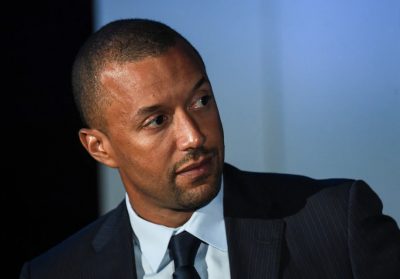 Monumental’s Sashi Brown stepping down to become Baltimore Ravens president. By Kareem Copeland / Wash Post
Monumental’s Sashi Brown stepping down to become Baltimore Ravens president. By Kareem Copeland / Wash Post
Monumental Basketball president Sashi Brown is stepping down from his position to take the same role with the Baltimore Ravens, the team announced Friday. Brown’s resignation comes less than three months after receiving a multiyear extension from Monumental. He was originally hired by Monumental CEO Ted Leonsis in 2019. The move is a return to the NFL for Brown, who previously worked in the front office for the Jacksonville Jaguars and Cleveland Browns. He is expected to join the Ravens next month. Read more
Site Information
Visit our home page for more articles, book/podcast and video favorites. And at the top of this page register your email to receive notification of new editions of Race Inquiry Digest. Click here for earlier Digests.
About Race Inquiry and Race Inquiry Digest. The Digest is published on Mondays and Thursdays.
Use the buttons below to share the Digest in an email, or post to your Facebook, Linkedin or Twitter accounts.